Unit 4 The art of having fun Period 2 Grammar(22页)课件【2024-2025学年英语外研版七年级下册】
文档属性
| 名称 | Unit 4 The art of having fun Period 2 Grammar(22页)课件【2024-2025学年英语外研版七年级下册】 |  | |
| 格式 | pptx | ||
| 文件大小 | 6.5MB | ||
| 资源类型 | 试卷 | ||
| 版本资源 | 外研版 | ||
| 科目 | 英语 | ||
| 更新时间 | 2025-04-09 18:22:03 | ||
图片预览

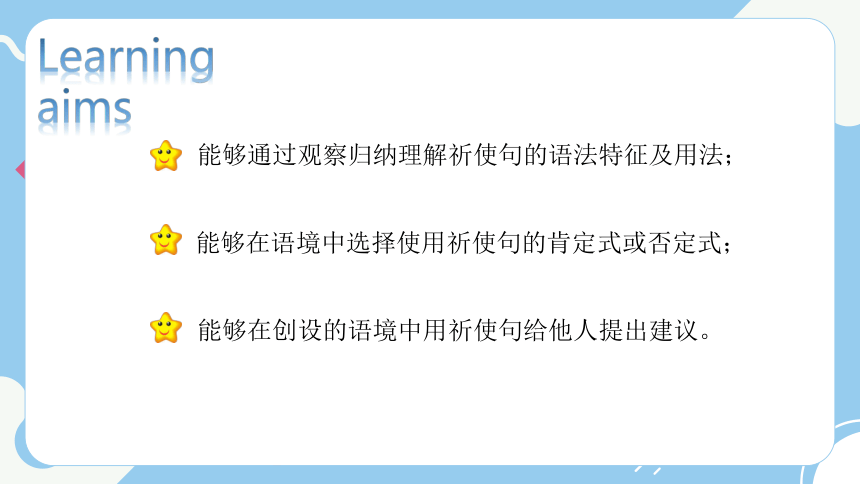


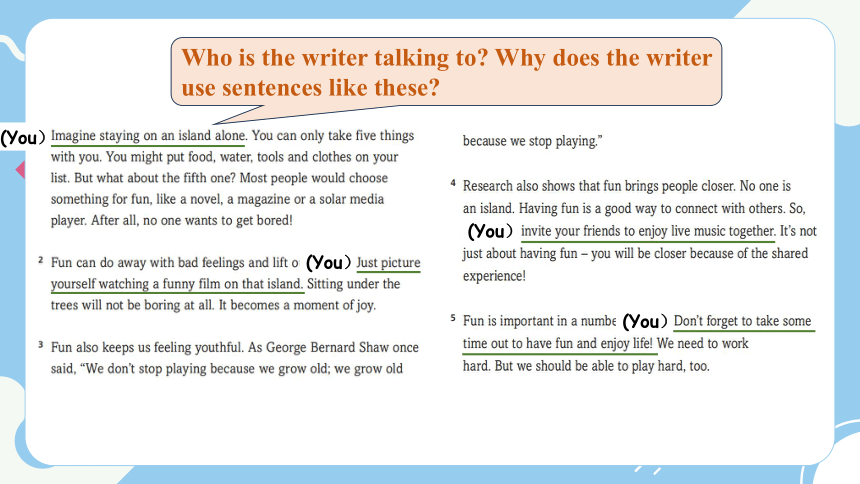
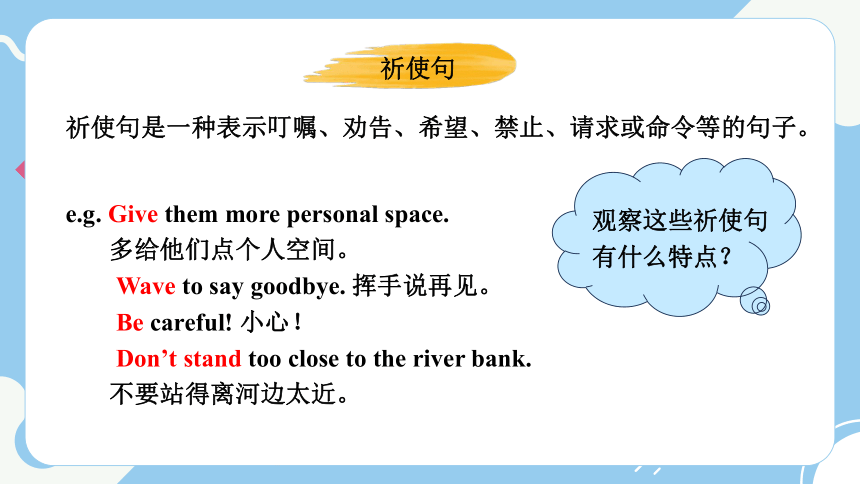
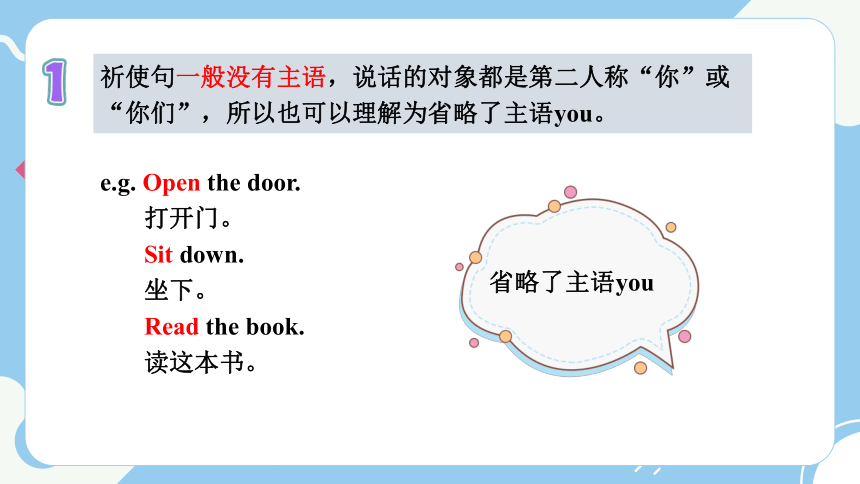
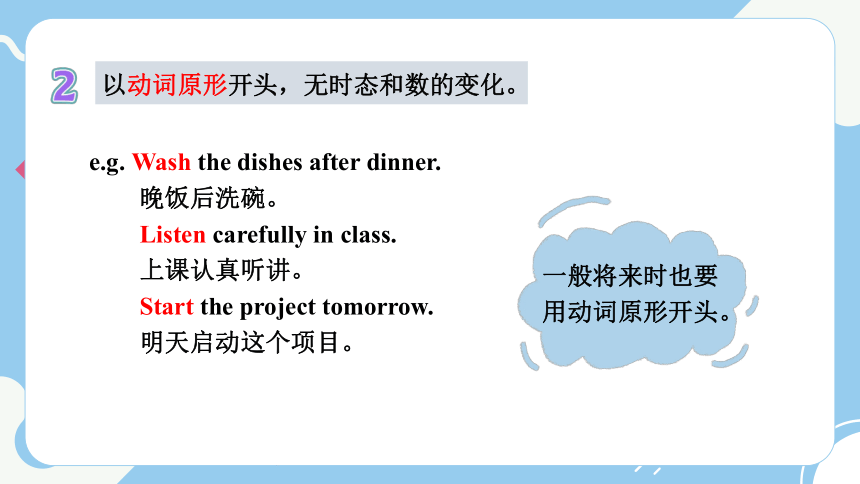
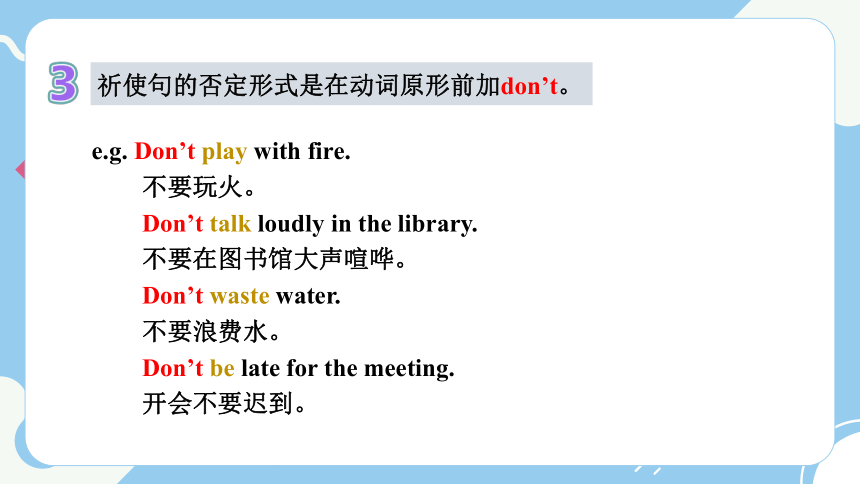
文档简介
(共22张PPT)
The art of having fun
Grammar
Unit 4
Learning aims
能够在创设的语境中用祈使句给他人提出建议。
能够在语境中选择使用祈使句的肯定式或否定式;
能够通过观察归纳理解祈使句的语法特征及用法;
We often see these signs in various settings.
Look and say
Lead-in
Read the sentences from the readng passage and summarise the grammar rules.
5
(a) Imagine staying on an island alone.
(b) Don’t forget to take some time out to have fun and enjoy life.
Summarize the grammatical features
两个句子都是动词开头
第一句开头使用动词原形
第二个句子使用Don’t +动词原形
Now find more sentences with these structures in the reading passage.
Who is the writer talking to Why does the writer use sentences like these
(You)
(You)
(You)
(You)
祈使句
祈使句是一种表示叮嘱、劝告、希望、禁止、请求或命令等的句子。
e.g. Give them more personal space.
多给他们点个人空间。
Wave to say goodbye. 挥手说再见。
Be careful! 小心!
Don’t stand too close to the river bank.
不要站得离河边太近。
观察这些祈使句有什么特点?
祈使句一般没有主语,说话的对象都是第二人称“你”或“你们”,所以也可以理解为省略了主语you。
e.g. Open the door.
打开门。
Sit down.
坐下。
Read the book.
读这本书。
省略了主语you
以动词原形开头,无时态和数的变化。
e.g. Wash the dishes after dinner.
晚饭后洗碗。
Listen carefully in class.
上课认真听讲。
Start the project tomorrow.
明天启动这个项目。
一般将来时也要用动词原形开头。
祈使句的否定形式是在动词原形前加don’t。
e.g. Don’t play with fire.
不要玩火。
Don’t talk loudly in the library.
不要在图书馆大声喧哗。
Don’t waste water.
不要浪费水。
Don’t be late for the meeting.
开会不要迟到。
在表达请求时,可以加上please。
e.g. Please pass the paper.
请递给我那张纸。
Please help me carry these boxes.
请帮我搬这些箱子。
Please close the window.
请关上窗户。
Please turn on the lights.
请打开灯。
在祈使句中表达比较强烈的语气时,可以用感叹号。
e.g. Stop talking now!
马上停止讲话!
Hurry up and finish your work!
赶紧完成你的工作!
Don't touch that expensive vase!
别碰那个昂贵的花瓶!
Pay attention to the road!
注意看路!
祈使句一般没有主语,说话的对象都是第二人称“你”
或“你们”,所以也可以理解为省略了主语you;
以动词原形开头,无时态和数的变化;
祈使句的否定形式是在动词原形前加don’t;
在表达请求时,可以加上please;
在表达比较强烈的语气时,可以用感叹号。
祈使句的特点:
祈使句的结构
祈使句的肯定形式:
1.动词原形 Do型宾语)+其他. Please have a seat here.
2.Be型 Be+表语+其他 Be a good child!
3.Let型 Let +宾语+动词原形+其他. Let me help you.
祈使句的否定形式:
1.动词原形
Be型
在句首加don't(若句首有please,则在please后加don’t)
2.Let型:
①Don’t + let +宾语+动词原形+其他.
②Let+宾语+not+动词原形+其他
3.用no开头,表示禁止的祈使句。
No smoking!禁止吸烟!
No fishing!禁止垂钓!
Complete the instructions with the verbs in brackets. Use don’t appropriately.
6
1 ___________ (worry) about winning – just enjoy yourself in sports.
2 ____(try) to put fun into your daily life, like listening to music while
doing housework.
3 _____(read) this passage to find why we should have fun.
Don’t worry
Try
Read
Work in pairs and give Jack some advice in the form of imperative sentences.
Jack is a workaholic (someone who is crazy about work). He spends most of his time working without playing. All his friends call him Dull Jack, Now Jack feels unhappy and he is in poor health. Can you give him some advice
Make a timetable for relaxation.
/ Try to take some time out with your family.
/ Don’t spend too much time in front of the desk.
/ Join a club or group according to your interests.
/ Plan some fun activities every week.
7
Complete the poster with the verbs in the box. Use don’t appropriately.
Join
Enjoy
Share
Explore
Don’t miss out
Make
call
Summary
祈使句的肯定形式:
1.动词原形 Do型宾语)+其他. Please have a seat here.
2.Be型 Be+表语+其他 Be a good child!
3.Let型 Let +宾语+动词原形+其他. Let me help you.
祈使句的否定形式:
1.动词原形
Be型
在句首加don't(若句首有please,则在please后加don’t)
2.Let型:
①Don’t + let +宾语+动词原形+其他.
②Let+宾语+not+动词原形+其他
3.用no开头,表示禁止的祈使句。
Exercise
句型转换。
1.You mustn’t talk aloud in public.
________ ________ aloud in public.
2.You’d better not stand under the tree in the rainy day.(改为同义句)
________ ________ under the tree in the rainy day.
3.No photos here. (改为同义句)
________ ________ photos here.
4.Shall we go to the supermarket to buy some vegetables (保持句义不变)
________ ________ to the supermarket to buy some vegetables.
5.Be careful! Here comes the bus! (同义句改写)
_________ _________! Here comes the bus!
6.If you are careless, you won’t get good marks in the coming final exams. (同义句)
________ ________, or you won’t get good marks in the coming final exams.
Don’t talk
Don’t stand
Don’t take
Let’s go
Look out
Be carful
Homework
Keep your
room clean
用祈使句为自己的房间制定一套规则,并做成海报。
Never write
on the walls
Don’t leave your shock on the floor
Useful sentences
Don’t stay up late
The art of having fun
Grammar
Unit 4
Learning aims
能够在创设的语境中用祈使句给他人提出建议。
能够在语境中选择使用祈使句的肯定式或否定式;
能够通过观察归纳理解祈使句的语法特征及用法;
We often see these signs in various settings.
Look and say
Lead-in
Read the sentences from the readng passage and summarise the grammar rules.
5
(a) Imagine staying on an island alone.
(b) Don’t forget to take some time out to have fun and enjoy life.
Summarize the grammatical features
两个句子都是动词开头
第一句开头使用动词原形
第二个句子使用Don’t +动词原形
Now find more sentences with these structures in the reading passage.
Who is the writer talking to Why does the writer use sentences like these
(You)
(You)
(You)
(You)
祈使句
祈使句是一种表示叮嘱、劝告、希望、禁止、请求或命令等的句子。
e.g. Give them more personal space.
多给他们点个人空间。
Wave to say goodbye. 挥手说再见。
Be careful! 小心!
Don’t stand too close to the river bank.
不要站得离河边太近。
观察这些祈使句有什么特点?
祈使句一般没有主语,说话的对象都是第二人称“你”或“你们”,所以也可以理解为省略了主语you。
e.g. Open the door.
打开门。
Sit down.
坐下。
Read the book.
读这本书。
省略了主语you
以动词原形开头,无时态和数的变化。
e.g. Wash the dishes after dinner.
晚饭后洗碗。
Listen carefully in class.
上课认真听讲。
Start the project tomorrow.
明天启动这个项目。
一般将来时也要用动词原形开头。
祈使句的否定形式是在动词原形前加don’t。
e.g. Don’t play with fire.
不要玩火。
Don’t talk loudly in the library.
不要在图书馆大声喧哗。
Don’t waste water.
不要浪费水。
Don’t be late for the meeting.
开会不要迟到。
在表达请求时,可以加上please。
e.g. Please pass the paper.
请递给我那张纸。
Please help me carry these boxes.
请帮我搬这些箱子。
Please close the window.
请关上窗户。
Please turn on the lights.
请打开灯。
在祈使句中表达比较强烈的语气时,可以用感叹号。
e.g. Stop talking now!
马上停止讲话!
Hurry up and finish your work!
赶紧完成你的工作!
Don't touch that expensive vase!
别碰那个昂贵的花瓶!
Pay attention to the road!
注意看路!
祈使句一般没有主语,说话的对象都是第二人称“你”
或“你们”,所以也可以理解为省略了主语you;
以动词原形开头,无时态和数的变化;
祈使句的否定形式是在动词原形前加don’t;
在表达请求时,可以加上please;
在表达比较强烈的语气时,可以用感叹号。
祈使句的特点:
祈使句的结构
祈使句的肯定形式:
1.动词原形 Do型宾语)+其他. Please have a seat here.
2.Be型 Be+表语+其他 Be a good child!
3.Let型 Let +宾语+动词原形+其他. Let me help you.
祈使句的否定形式:
1.动词原形
Be型
在句首加don't(若句首有please,则在please后加don’t)
2.Let型:
①Don’t + let +宾语+动词原形+其他.
②Let+宾语+not+动词原形+其他
3.用no开头,表示禁止的祈使句。
No smoking!禁止吸烟!
No fishing!禁止垂钓!
Complete the instructions with the verbs in brackets. Use don’t appropriately.
6
1 ___________ (worry) about winning – just enjoy yourself in sports.
2 ____(try) to put fun into your daily life, like listening to music while
doing housework.
3 _____(read) this passage to find why we should have fun.
Don’t worry
Try
Read
Work in pairs and give Jack some advice in the form of imperative sentences.
Jack is a workaholic (someone who is crazy about work). He spends most of his time working without playing. All his friends call him Dull Jack, Now Jack feels unhappy and he is in poor health. Can you give him some advice
Make a timetable for relaxation.
/ Try to take some time out with your family.
/ Don’t spend too much time in front of the desk.
/ Join a club or group according to your interests.
/ Plan some fun activities every week.
7
Complete the poster with the verbs in the box. Use don’t appropriately.
Join
Enjoy
Share
Explore
Don’t miss out
Make
call
Summary
祈使句的肯定形式:
1.动词原形 Do型宾语)+其他. Please have a seat here.
2.Be型 Be+表语+其他 Be a good child!
3.Let型 Let +宾语+动词原形+其他. Let me help you.
祈使句的否定形式:
1.动词原形
Be型
在句首加don't(若句首有please,则在please后加don’t)
2.Let型:
①Don’t + let +宾语+动词原形+其他.
②Let+宾语+not+动词原形+其他
3.用no开头,表示禁止的祈使句。
Exercise
句型转换。
1.You mustn’t talk aloud in public.
________ ________ aloud in public.
2.You’d better not stand under the tree in the rainy day.(改为同义句)
________ ________ under the tree in the rainy day.
3.No photos here. (改为同义句)
________ ________ photos here.
4.Shall we go to the supermarket to buy some vegetables (保持句义不变)
________ ________ to the supermarket to buy some vegetables.
5.Be careful! Here comes the bus! (同义句改写)
_________ _________! Here comes the bus!
6.If you are careless, you won’t get good marks in the coming final exams. (同义句)
________ ________, or you won’t get good marks in the coming final exams.
Don’t talk
Don’t stand
Don’t take
Let’s go
Look out
Be carful
Homework
Keep your
room clean
用祈使句为自己的房间制定一套规则,并做成海报。
Never write
on the walls
Don’t leave your shock on the floor
Useful sentences
Don’t stay up late
同课章节目录
